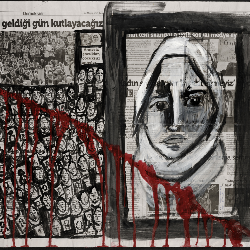Political Violence and Self-Defense in Turkey: History and Ethnography (Melissa Bilal and Haydar Darıcı)

When:
Friday, April 2, 2021
12:00 PM - 1:30 PM CT
Where: Online
Audience: Faculty/Staff - Student - Public - Post Docs/Docs - Graduate Students
Cost: Free
Contact:
Danny Postel
danny.postel@northwestern.edu
Group: Middle East and North African Studies
Co-Sponsor:
Roberta Buffett Institute for Global Affairs
Keyman Modern Turkish Studies Program at the Roberta Buffett Institute
Category: Global & Civic Engagement, Academic, Lectures & Meetings, Multicultural & Diversity
Description:
Registration is required for this event:
http://bit.ly/political-violence-turkey
This event brings together two scholars working on two self-defense struggles of the peoples of Turkey that took place a century apart. The first is the Chork Marzban/Dört-Yol resistance during the 1909 massacres of Ottoman Armenians in the Adana province, narrated by an Armenian feminist writer of the time, Arshaguhi Teotig. The second is the establishment of self-governance institutions by the people of the Kurdish city of Cizre in 2012. Reflecting on the various common issues between these struggles, such as sovereign power, political violence, local autonomy, spatial control, solidarity, representation, and narratives of self-defense, Melissa Bilal and Haydar Darıcı will engage in a conversation on the past and present of collective self-determination in Turkey. The conversation will be moderated by the two Keyman Postdoctoral Fellows, Anoush Tamar Suni and Deniz Duruiz.
Presentation #1 (Melissa Bilal)
“Stories of dreadful iniquities and unutterable suffering:” Arshaguhi Teotig’s Accounts on Violence and Self-Defense in Cilicia, 1909
In October 1909, Arshaguhi Teotig embarked on a ship for the Mediterranean coastal city of Mersin, where many Armenians had found refuge surviving the nearby towns hit by massacres. During the month she stayed in the region, she arranged the opening of a girls’ school and worked for the survivor relief campaign. During and after her stay, she published articles in Constantinopolitan newspapers in order to call Armenians to extend a helping hand to the starving and unsheltered people. Her monograph Amis Me I Giligia (A Month in Cilicia) is a historic text both as a testimony of her witnessing the aftermath of the massacres and as the uncompromised political voice of an Ottoman Armenian intellectual woman. Arshaguhi visited Armenian political prisoners who were unjustly convicted by false accusations by the Young Turk government and the local Ottoman authorities. She questioned the legitimacy of a legal system that worked for the benefit of the sovereign power. She documented in detail what she heard from the participants of the Dört-Yol resistance and raised a philosophical discussion on the definition of people’s self-defense. While acknowledging Christians and Muslims who saved lives, based on oral accounts she collected, she criticized foreign military forces who chose to photograph the violence instead of stopping it and under the disguise of humanitarian aid, humiliated the survivors by entertaining themselves with their misery. This talk will focus on Armenian feminist writer, journalist, educator, and activist Arshaguhi Teotig and her narrative on what is today known as the 1909 Cilician massacres.
Presentation #2 (Haydar Darıcı)
The Event of Politics: Autonomy and Self-defense in Cizre
In the midst of the Syrian civil war that started in 2012, the Kurds of Rojava utilized the power vacuum to establish a bottom-up self-governance developed by Abdullah Ocalan, the PKK’s imprisoned leader, just as the PKK and the Turkish government announced the inauguration of peace talks in Turkey. When the peace process entered a deadlock due to the government’s refusal to carry out the negotiations within the legal framework, the PKK followed in the footsteps of the Rojavan Kurds to initiate a project of democratic autonomy in Turkey’s Kurdistan. However, unlike Syria, there was no power vacuum in Turkey to hold onto; the state was very much present in the region even if it was in a standby mode during the peace process. Nonetheless, this did not stop the PKK from establishing new institutions ranging from neighborhood and city councils to courts, and from schools to armed self-defense forces formed by local youth, who, as a self-defense practice, dug trenches around their neighborhoods to block the entry of state forces permanently. The digging of trenches, which started in Cizre, a Kurdish town near Turkey’s border with Syria and Iraq, quickly became a key expression of self-defense across the region. Focusing on the formation of self-governance in Cizre, this presentation will explore the process in which the practices of self-defense, delegated primarily to the youth, came to substitute the entire project of collective self-determination.
About the Speakers
Melissa Bilal is Distinguished Research Fellow at the Center for Near East Studies and Lecturer in the Department of Ethnomusicology at UCLA. Her research, publications, and teaching focus on Ottoman Armenian women's political thought and activism; the history of Armenian music ethnography; and the sonic and affective transmission of Armenian memory in Turkey. She is currently collaborating with Lerna Ekmekçioğlu on a book and a digital humanities project featuring the lives and works of twelve Armenian feminist writers in the Ottoman and post-Ottoman contexts. She is also working on her monograph on the gendered politics of indigeneity, music, and memory in the late Ottoman Armenian revolutionary imagination.
Haydar Darici is a postdoctoral fellow in Kurdish Studies at American University in Washington, DC. He received his Ph.D. in the joint program in Anthropology and History at the University of Michigan, Ann Arbor. His work on youth politics of resistance in Kurdistan has appeared in journals such as the International Journal of Middle East Studies, New Perspectives on Turkey, and Theory and Event.
Registration is required for this event:
http://bit.ly/political-violence-turkey
A MESA Global Academy event co-sponsored by the Middle East & North African Studies Program and the Keyman Modern Turkish Studies Program at Northwestern University
artwork by Zehra Doğan